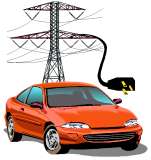| Electric Cars, Fuel Cells and Hybrids |
|
 |
|
Electric vehicles Electric vehicles themselves produce no emissions but of course the emissions from the electric power plants needed to charge the batteries still remain, even so EVs are much cleaner than petrol vehicles. EVs operate almost twice as efficiently as a petrol vehicle in energy use per mile travelled, and they offer low maintenance costs;
Using lead-acid batteries the original electric cars could travel approximately 50 - 60 miles before needing to re-charge but with newer Nickel metal-hydride batteries this has now been increased to 190 to 220 km (120 to 140 miles) in city driving i.e. 40-56kph (25-30 mph). Electric vehicles are good for short distances with lots of starting and stopping, making them excellent commuter vehicles, and a number of council vehicles such as street cleaners and patrol vehicles are now electrically driven. Toyota has been working on electric vehicles for more than a quarter-century. Last year in Japan, Toyota launched the RAV4 EV, the world's first commercially produced vehicle powered with the new batteries the car can reach speeds of 125 kph, (~ 78 mph). Toyota believe that more improvement in cost, driving range, and charging time will be required to compete with petrol powered vehicles but electric vehicles are on the increase. In addition electric bikes and motorcycles are also taking off and motorbike and bicycle manufacturers hope that new electric models will be able to start replacing the polluting motorcycles that are the backbone of the third world's transportation system. Fuel Cells ~ the new kid on the block Fuel cell technology has developed at a rapid pace over the last 2-3 years and fuel cell cars are an attractive advance from battery-powered cars. They offer the advantages of battery-powered vehicles but can also be refuelled quickly and can travel further between refuelling. In principle, a fuel cell operates like a battery but unlike a battery, a fuel cell does not run down or require "recharging" as such and will produce energy in the form of electricity and heat as long as fuel is supplied. Since the fuel cell relies on chemistry and not combustion, emissions from this type of a system are much smaller than emissions from the cleanest fuel combustion processes. There are currently varieties of fuel cells using different fuels both under development and in use in real situations. Those that rely on hydrogen, as a fuel would be zero emission vehicles, and those using other fuels would produce near-zero emissions. |